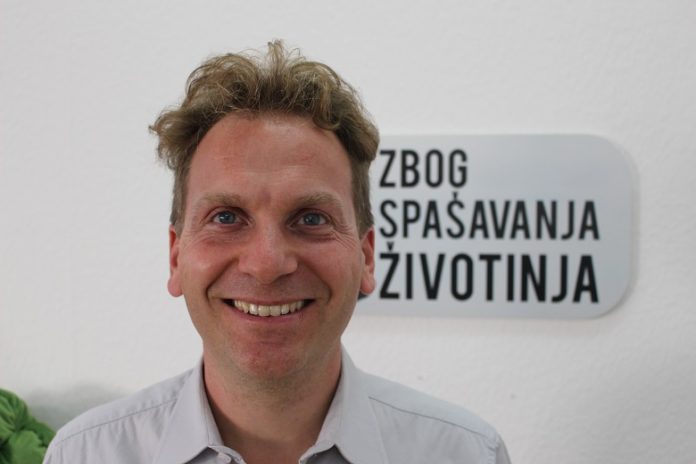Ministry of Agriculture has initiated neutering campaigns for dogs in Roma settlements in Međimurje County. The campaign started in May in Kuršanec settlement and it implies neutering of all dogs in order to prevent their further breeding and intake of new unwanted animals. The campaign implies catching all dogs, neutering (male and female dogs older than six months) and return of neutered dogs to their owners or individuals as well as their adoption.
Animal Friends Croatia has joined this campaign. This organisation has already organised hundreds of campaigns and actions in order to draw public attention towards the suffering of animals in food industry, laboratories, fur farms, hunt and fishery, entertainment industry and to educate individuals on the issue of animal abandon and abuse. On 12 August 2016 public consultations were organised about the proposal Bill on Animal Protection Act, which then closed on 12 September 2016. The Act was promulgated on 20 October 2017 stipulating and amending the whole series of provisions. We talked to Luka Oman, President of the “Prijatelji životinja” organisation, about the legislation, new initiatives but also about veganism and ZOOs.
When have you become a vegan? What was crucial for your decision?
In elementary school I moved from town to village and soon saw with my own eyes all the brutality of the relationship between humans and animals. One pig slathering was enough to take the decision to become a vegetarian. In high school I came upon some incredible data on terrible animal practices and the destruction of the environment, and decided that I did not want to be part of it in any way and thus become a veggie. The next step to get active in any way was logical and because of everything I knew I could not close my eyes before so much injustice. Even today I’m surprised at the fact that more than 60 billion animals a year are exposed to suffering and then death, all because of, not our need, but habit of eating meat, eggs and dairy products. All this genocide is done at the expense of the environment in which we live and depend on, at the expense of hungry people and future generations. I believe that veganism is the simplest, cheapest and most concrete way for each of us to take part in saving the world and creating a better future for everyone, both animals and people.
Animal shelters are full. How can we solve that?
Thanks to the new Animal Protection Act, which came into force in October last year, we finally, after many years of fighting and thanks to the great efforts of animal protection associations and the support of citizens and celebrities, legalised the ban on killing animals in shelters. The law introduces a number of news and excellent tools for local communities whose application will not even meet the need to place animals in a shelter, and will provide great savings on animal care. One of these tools is the mandatory control of microchipping dogs, which must be completed by June 30 this year, in a way that municipal officers visit all the houses and check if all dogs are properly labeled with a microchip, which many local communities have already done. The second measure that local communities may apply as a special order or through a city decision on the conditions and manner of keeping pets and how to deal with abandoned and lost animals, is ordaining permanent sterilisation as a mandatory control measure for breeding of dogs and cats. Mister Kajtazi is responsible for this, amending this provision in the Act, what represents a great success and we are all very grateful to him.
With the obligation of permanent sterilisation of animals in shelters, this is the only effective way to reduce the number of abandoned animals, as well as the number of killed puppies and kittens who are drowned by irresponsible owners, left in the forest, or disposed in other ways. These measures are extremely important because the victims, that is the animals who end up in shelters due to human negligence, will no longer be punished, but finally through legally binding obligations they will encourage irresponsible owners who do not microchip and abandon their animals to comply with the law so as not to have to pay the penalties. Also, local self-government units that do not fulfil their legal obligations, such as citizen education, opening info-centres, introduction of neutering and adoption programs, will be punished.
In short, shelters will become empty if the law is implemented and if we specifically impact the cause of the problem, which is the citizen’s irresponsibility, together with the promotion of dog adoption instead of buying animals.
What every person can do in order to make a difference in their own community?
First step is education. There are numerous valuable books and films about the animal rights and veganism; one of them is this excellent, several times awarded documentary The Earthlings. We need to recheck everything we think we know about the world, everything we were taught and today in the Internet era it is easier than ever. We need to understand that animal, being a living creature, has its own value; its value does not depend on its utility, beauty, funny character or how fond another kind is of it. It is our moral obligation to provide alternatives for animal exploitation. We live in times in which there are no excuses for any way of digesting or abusing other living creatures and still it is so inherent to our living habits that we exploit animals even when there is no objective need for that (for example, exploitation of animals in entertainment industry or in sports) and even when we have proven negative impact on environment and our health (exploitation of animals for the habit of consuming meat, milk and eggs). Our treatment of animals is closely related to our survival on this planet.
After being introduced to the facts every person can act in several ways, first of all by changing their own bad habits in treatment of animals. Then they set an example to others and spread information without judging the others. They can encourage the others to do the same, they can volunteer in an organisation and support their work with membership and donations, they can be active on Internet, they can organise public campaigns and so on. When it comes to abandoned animals we encourage everyone to adopt a dog or a cat, if they have conditions for this, instead of buying, and to take care of them responsibly (neutering, microchipping, veterinary care, etc.). It is important to increase awareness how bad it is to chain a dog because it is also considered animal abuse which provokes great suffering to dogs which, being social creatures, seek people and as any other creature need the freedom of movement.

Are Croats responsible pet owners?
Considering numerous cases of animal abandon and abuse that we have been witnessing daily as well as other organisations in Croatia, we cannot say that people in Croatia are responsible enough. Especially in smaller and rural places it is necessary to educated them starting from the kindergarten. There is still prejudice about neutering that the first litter must be kept or that males should not be neutered. Besides, chaining dogs without a shelter from the weather, without adequate water and food shows that many have the wrong perception of animals as objects without needs and feeling. We believe that anyone considering taking care of a dog or a cat should think twice because it a long-term commitment requiring financial means for food, veterinary and other expenses. We advise everyone against adopting animals if they do not have favourable conditions for that and we always emphasise to adopt and not to buy animals.
What are the greatest problems facing dogs in Roma settlements?
Situation is really alarming. Dogs live freely but are not neutered or microchipped. They are hungry, abused, sick and tired of life. There are packs of dogs wandering around these settlements and female dogs give birth to puppies in a soil hole every six to eight months, they eat rubbish and excrement from baby diapers because there is no other food and the puppies even freeze to death or die of hunger or diseases. They die on a daily basis in agony due to diseases, wounds or long lasting painful hunger. Due to some 3000 dogs in Roma settlements since 2012 the number of sheltered dogs in Čakovec has tripled! The shelter sometimes receives 20 dogs in one day from these settlements and almost none of them is healthy. Once they are in a shelter, besides the indispensable veterinary help and surgeries necessary because of diseases and wounds, they need a certain time to recover psychically in order to be ready for adoption. Neutering of all dogs is urgent in order to stop further suffering of these animals which would also be good for the residents of these settlements.
Isn’t it a symptom of a bigger problem and if yes, which one?
Unfortunately, this enormous issue of dogs in Roma settlements has not been caused by the Roma exclusively, since they themselves need all sorts of help and education from local communities and the state, but also by the residents from the neighbourhood who leave the unwanted dogs in front of Roma settlements getting rid of their own responsibility and breaking the law. Irresponsible dog owners thus contribute to the problem instead of helping solving it.
Together with Mister Kajtazi you have been campaigning neutering program and prevention of abandoned dogs problem in Roma settlements. Which settlements are we talking about and what is the feedback from municipal heads / mayors / county heads in those places?
Mister Kajtazi has been strongly engaged in solving this issue and we as organisation are very thankful to him. We are also glad to see that local communities in Međimurje are aware of necessity to solve this long-lasting problem and ready to cooperate. Stipulating mandatory permanent sterilisation will certainly contribute to reduction of abandoned animals, meaning that such a measure is really necessary.

What is the situation in the rest of Croatia? Are the laws implemented and are the irregularities punished? Is it necessary to educate the population?
It is a shame and injustice for the animals and the conscious majority of our citizens that in spite of a legal obligation introduced in 2004 there are still 30 per cent of not microchipped dogs out there. Microchipping controls aim to demonstrate the irresponsible individuals that if they do not comply with their legal obligation, they will have to pay a fine of 6000 HRK. New law stipulates higher penalties for animal abandonment so they are 30,000 HRK. Besides penalties, education is of paramount importance. For years now we have been campaigning in order to educate owners about the importance of responsible treatment of their dogs and cats, among them we can emphasise our most famous traditional summer campaign “Family to the Seaside, Dog to the Street?!”. As a part of that campaign last year we prepared a leaflet about the legal obligations of dog owners and offered it to all local communities to distribute it to the households in their area. Leaflet was published in cooperation with the Association of Municipalities and many cities have already published it in tens of thousands copies and distributed it to our citizens together with their utility bills. We believe this is a good way to educate citizens so they can become familiar with legal obligations and responsibilities for dog owners.
What about dog racing and animals bred for fur considering that both are banned in Croatia due to the Animal Protection Act?
Animal Protection Act prohibits dog racing and the fine laid down for this offence is from 30 to 50 thousand HRK for a legal person, or 15 to 30 thousand HRK for a physical person. Banning animals bred for fur is an extraordinary success of all Croatian citizens and something Croatia can be truly proud of. We are glad that some breeders have released their chinchillas and they have been adopted and saved from cruel destiny in fur industry.
And finally, the ZOO. Yes or No?
Animals are living creatures and cannot be objects exhibited in a gallery. Under the pretext of education apathetic animals spend their whole life in cages for some visitors to spend several moments observing them and then return to their lives. No matter how nice environment it has, ZOO is a prison for the innocent and its inmates spend their lives in agony. We should ask ourselves if we really want to support that in times of high-resolution cameras and drones. The story of saving species which would otherwise be extinct in the wild is a deception, that is just another “modern” justification for animal abuse. Instead of investing money in construction of ZOO-prisons, our efforts should be directed towards the preservation of natural habitats endangered by humans.












